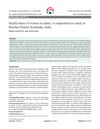 1 citations,
December 2021 in “Annals of phytomedicine”
1 citations,
December 2021 in “Annals of phytomedicine” The herbal hair dye with a 1:2 henna to indigo ratio works well, is safe, and eco-friendly.
 1 citations,
October 2021 in “Indian Journal of Plastic Surgery/Indian journal of plastic surgery”
1 citations,
October 2021 in “Indian Journal of Plastic Surgery/Indian journal of plastic surgery” Proper hair care and safe use of hair products are crucial for those with hair loss.

Using microneedling with PRP improves skin and hair conditions more than microneedling alone.
 1 citations,
February 2021 in “Animal feed science and technology”
1 citations,
February 2021 in “Animal feed science and technology” Organic selenium may offer better retention and less waste in puppies.
 1 citations,
January 2021
1 citations,
January 2021 CD4+ skin cells may be precursors to basal cell carcinoma.
 1 citations,
June 2020 in “bioRxiv (Cold Spring Harbor Laboratory)”
1 citations,
June 2020 in “bioRxiv (Cold Spring Harbor Laboratory)” Fetal skin has unique immune cells different from adult skin.
 1 citations,
January 2020
1 citations,
January 2020 The pomegranate-based herbal shampoo works well and is safe for daily use.
 1 citations,
January 2019 in “Elsevier eBooks”
1 citations,
January 2019 in “Elsevier eBooks” Electrospun matrices help regenerate skin and hair follicles using PCL and collagen scaffolds.
 1 citations,
September 2017 in “Frontiers in Laboratory Medicine”
1 citations,
September 2017 in “Frontiers in Laboratory Medicine” Gut flora changes could potentially indicate depression, but more research is needed.
 1 citations,
May 2017 in “InTech eBooks”
1 citations,
May 2017 in “InTech eBooks” Some natural remedies may help with hair regrowth, but more research is needed to confirm their effectiveness and safety.
 1 citations,
January 2017 in “Springer eBooks”
1 citations,
January 2017 in “Springer eBooks” Flavonoids and Nod factors are key for legume plant growth and could help in sustainable farming.
 1 citations,
January 2016 in “International journal of research in ayurveda and pharmacy”
1 citations,
January 2016 in “International journal of research in ayurveda and pharmacy” The study found that a specific combination of five medicinal plants effectively inhibits the fungus that causes dandruff.
 1 citations,
November 2015 in “Indian Journal of Clinical Biochemistry”
1 citations,
November 2015 in “Indian Journal of Clinical Biochemistry” The conference presented findings on how vitamin D levels, genetic factors, and lifestyle choices like smoking and yoga affect various health conditions and diseases.
 February 2025 in “International Journal of Advanced Research in Science Communication and Technology”
February 2025 in “International Journal of Advanced Research in Science Communication and Technology” Fenugreek seeds may improve hair health and growth.
 January 2025 in “International Journal of Advanced Research in Science Communication and Technology”
January 2025 in “International Journal of Advanced Research in Science Communication and Technology” Herbal shampoos effectively promote hair growth and control dandruff using traditional herbs and modern technology.

The polyherbal hair mask is a safe and effective alternative for improving hair health.
 December 2024 in “International Journal of Research in Ayurveda and Pharmacy”
December 2024 in “International Journal of Research in Ayurveda and Pharmacy” Sowbhagya Chundi Legiyam helps postpartum women recover and prevent infections.
 December 2024 in “THE SCIENTIFIC TEMPER”
December 2024 in “THE SCIENTIFIC TEMPER” Women in Raichur slums need better health awareness and medical help.
 December 2024 in “International Journal of Drug Delivery Technology”
December 2024 in “International Journal of Drug Delivery Technology” A gel with dutasteride and 10% garlic extract may effectively treat male pattern baldness.
 December 2024 in “African Journal of Biomedical Research”
December 2024 in “African Journal of Biomedical Research” Combining lifestyle changes and medication is most effective for managing PCOS symptoms.

Neem leaf extract combined with eucalyptus and lemongrass oils can effectively treat Tinea capitis.
 May 2024 in “International journal of nanomedicine”
May 2024 in “International journal of nanomedicine” Plant-derived extracellular vesicles show promise for treating diseases like cancer and inflammation.
 April 2024 in “Research Square (Research Square)”
April 2024 in “Research Square (Research Square)” 16-MHA can restore the barrier and moisture of damaged hair, making it similar to undamaged hair.
 April 2024 in “Cell death and disease”
April 2024 in “Cell death and disease” Long COVID causes various long-term health issues and needs better awareness and treatment.
 April 2024 in “International journal of women's health”
April 2024 in “International journal of women's health” Adult female acne is a complex condition that can worsen with menopause, requiring holistic treatment and tailored skincare at different life stages.
 March 2024 in “Journal of Pharmaceutical and Sciences”
March 2024 in “Journal of Pharmaceutical and Sciences” Zaleya pentandra extracts, especially acetone, may be useful for new medicines and food industry applications.

New insights into cell communication in psoriasis suggest innovative drug treatments.
 January 2024 in “Scientific reports”
January 2024 in “Scientific reports” Egyptian Mint effectively kills mosquito larvae and inhibits certain bacteria.
 January 2024 in “Journal of neurogastroenterology and motility”
January 2024 in “Journal of neurogastroenterology and motility” Quadruple-coated probiotics significantly improve IBS symptoms.
 January 2024 in “Polski Merkuriusz Lekarski”
January 2024 in “Polski Merkuriusz Lekarski” Pica disorder in central Iraq is mainly found in females and is linked to low iron levels; treatment with iron improves most patients.






























